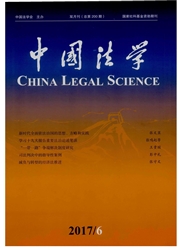

 中文摘要:
中文摘要:
我国环境法中有关的环境权利和环境权力规范存在着内在张力下的结构失衡和运行冲突。走向多元合作共治,是环境风险时代解决环境问题的根本出路,无论对于政治国家的环境权力,还是对于市民社会的环境权利,环境法都不可能舍此求彼,而必须“两面作战”,环境法学理论研究应当具备这种全景式的面向。从经验和事实出发,在对学界关于环境法学核心范畴的现有理论和学说进行分析批判的基础上,提出“环境法的法权”这一命题。基于环境利益之上的环境权利、环境权力应当是环境法学领域最基本、最重要的元概念,二者虽然不具同质性,但彼此合作共进、竞争成长,共同构成环境法制度大厦的基石。环境法法权结构的规范建构,有助于实现环境权利与环境权力架构的内外部相互制衡与协作,为迈向多元合作共治的现代环境治理模式奠定制度基础。
 英文摘要:
英文摘要:
The Environmental Law is an official regulation focusing on environmental issues; however, there are problems of structural imbalance and implementation conflicts between norms of environmental right and norms of environmental power under internal tension. Hence, common governing by multiple subjects is the fundamental way out for the environmental problems in the era of environmental risk. The Environmental Law has to choose a way which can make maximum benefits based on environmental power of political state and environmental right of civil society and thus theoretical research on the Environmental Law should be panorama-oriented. On the basis of analysis and criticism of existing theories about the Environmental Law's core category, this article puts forward the proposition of "legal rights of the Environmental Law" through the analysis of experience and facts. Environmental right and power which are based on environmental interests should be the most fundamental and important core concept in the field of the Environmental Law. Although they have no homogeneity with each other, they commonly form the footstone of the environmental system through consecutive cooperation and competition. The normative construction of the structure of the Environmental Law is conducive to realize the checks and balance in the structure of environmental right and for the mode of modern environmental governance. power, and lay an institutional foundation
 同期刊论文项目
同期刊论文项目
 同项目期刊论文
同项目期刊论文
 期刊信息
期刊信息
